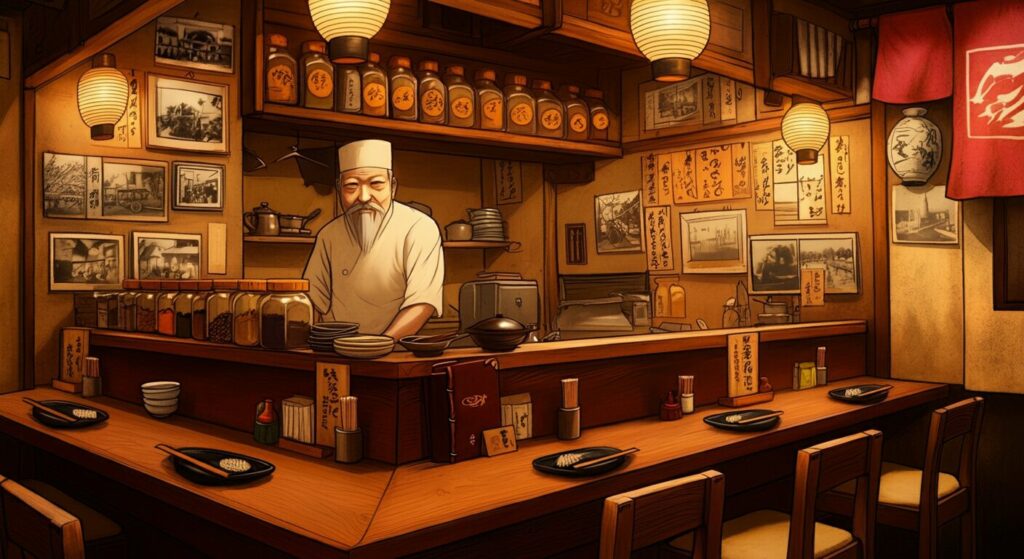2024-11-28 Story Dice: Travel Adventures!
Food Adventure Story
Story Dice Used
- Light bulb → restaurant sign
- Hand → pointing at menu
- Question mark → unknown dish
- Footprints → walking into kitchen
- Globe → world spice collection
Synopsis
“I saw a bright sign (light bulb) for a local restaurant. The chef pointed (hand) to something on the menu, but I didn’t know what it was (question mark). He invited me (footprints) into his kitchen where he showed me his collection of spices from around the world (globe). He taught me how to make his special curry!”

The Story: “The Mystery Menu” (480 words)
In Kanazawa’s old district, a single bright lantern (light bulb) caught my eye×「catch one's eye」は「目を引く、注目を集める」という意味の慣用句です。
文法説明:
- 過去形では「caught my/his/her eye」となります
- 何かが視覚的に注意を引いた時に使われます
例文:
A beautiful dress in the window caught her eye.
ショーウィンドウの美しいドレスが彼女の目を引きました。. The restaurant beneath×「beneath」は「〜の下に」という意味の前置詞です。
文法説明:
場所や位置関係を示し、より文学的な表現として「under」の代わりに使われます。
例文:
The cat was sleeping beneath the table.
猫はテーブルの下で寝ていました。 it was tiny – just a wooden door with a faded×「faded」は「色あせた、薄れた」という意味の形容詞です。
文法説明:
「fade」(色あせる)の過去分詞が形容詞として使われています。
例文:
She wore a faded blue jean jacket.
彼女は色あせたブルージーンのジャケットを着ていました。 noren curtain. No English menu, no plastic food displays×「plastic food display」は「プラスチック製の食品サンプル」という意味です。
文法説明:
「plastic」(プラスチックの)が「food display」(食品展示)を修飾する複合名詞です。
例文:
Japanese restaurants often use plastic food displays in their windows.
日本のレストランはよく店頭にプラスチック製の食品サンプルを置いています。, just an intriguing×「intriguing」は「興味をそそる、魅力的な」という意味の形容詞です。
文法説明:
好奇心や関心を引き起こすような魅力を表現します。
例文:
She told an intriguing story about her travels.
彼女は自分の旅について興味深い話をしました。 aroma×「aroma」は「香り、芳香」という意味の名詞です。
文法説明:
特に食べ物の良い匂いを表現する際に使われます。
例文:
The aroma of fresh coffee filled the room.
新鮮なコーヒーの香りが部屋に満ちていました。 that made my stomach growl×「make one's stomach growl」は「お腹が鳴る」という意味の表現です。
文法説明:
- 「make + 目的語 + 動詞」の使役表現
- 「stomach growl」はお腹が空いた時の音を表します
例文:
The smell of pizza made my stomach growl.
ピザの匂いで私のお腹が鳴りました。.
Inside, there were only six counter seats. The chef, an older man with kind eyes, looked up from his cooking and pointed (hand) to the handwritten×「handwritten」は「手書きの」という意味の形容詞です。
文法説明:
「hand」(手)と「written」(書かれた)が結合した複合形容詞です。
例文:
She received a handwritten letter from her grandmother.
彼女は祖母からの手書きの手紙を受け取りました。 menu on the wall. It was entirely×「entirely」は「完全に、全く」という意味の副詞です。
文法説明:
程度や状態が100%であることを強調する際に使われます。
例文:
The book was written entirely in French.
その本は完全にフランス語で書かれていました。 in Japanese, with characters I couldn’t read. When I hesitated×「hesitate」は「躊躇する、ためらう」という意味の動詞です。
文法説明:
- 「when I hesitated」は時を表す従属節です
- 不確かさや決断できない状態を表します
例文:
She hesitated before answering the question.
彼女は質問に答える前にためらいました。, he smiled and tapped one particular item on the menu.
I saw the question mark expression×「expression」は「表情、表現」という意味の名詞です。
文法説明:
顔に表れる感情や気持ちを表す際によく使われます。
例文:
A worried expression crossed his face.
心配そうな表情が彼の顔を横切りました。 on my own face reflected in the polished×「polished」は「磨かれた、ピカピカの」という意味の形容詞です。
文法説明:
「polish」(磨く)の過去分詞が形容詞として使われています。
例文:
The polished marble floor shone brightly.
磨かれた大理石の床が明るく輝いていました。 counter. “Omakase?” I asked, remembering the word for ‘chef’s choice.’ He shook his head and pointed again to that specific dish, making enthusiastic×「enthusiastic」は「熱心な、意欲的な」という意味の形容詞です。
文法説明:
人の行動や態度に関して、強い興味や情熱を示す時に使われます。
例文:
She gave an enthusiastic response to the idea.
彼女はその考えに熱心な反応を示しました。 cooking gestures.
Curious×「curious」は「好奇心のある、興味を持った」という意味の形容詞です。
例文:
She was curious about the strange noise.
彼女は不思議な音に興味を持ちました。, I nodded. He beamed×「beam」は「(うれしさで)輝くように笑う」という意味の動詞です。
文法説明:
幸せや喜びで顔を輝かせるような笑顔を表現します。
例文:
The child beamed with joy at the sight of his present.
その子供はプレゼントを見て喜びで顔を輝かせました。 and immediately started working. I watched his steps as he moved gracefully between his prep area×「prep area」は「下準備をする場所、仕込みスペース」という意味の複合名詞です。
文法説明:
「prep」は「preparation」(準備)の略語で、「area」(場所)と組み合わさっています。
例文:
The chef kept his prep area clean and organized.
シェフは仕込みスペースを清潔で整理された状態に保っていました。 and a wall of jars filled with colorful spices. The jars, I realized, were labeled in multiple languages – a globe-spanning collection×「a globe-spanning collection」は「世界中に及ぶコレクション」という意味の表現です。
文法説明:
「globe-spanning」(世界規模の)が形容詞として「collection」を修飾する複合語です。
例文:
He had a globe-spanning collection of rare coins.
彼は世界中の珍しいコインのコレクションを持っていました。 of seasonings×「seasoning」は「調味料、香辛料」という意味の名詞です。
例文:
She added various seasonings to enhance the flavor.
彼女は風味を引き立てるために様々な調味料を加えました。 from every continent×「continent」は「大陸」という意味の名詞です。
例文:
Asia is the largest continent on Earth.
アジアは地球最大の大陸です。.
He must have noticed my interest because he gestured×「gesture」は「身振り、手振りをする」という意味の動詞です。
例文:
He gestured for me to sit down.
彼は私に座るように身振りで示しました。 for me to follow him into his tiny kitchen. There, he showed me a worn×「worn」は「使い古された、擦り切れた」という意味の形容詞です。
例文:
She carried a worn leather bag.
彼女は使い古した革のバッグを持っていました。 leather-bound×「leather-bound」は「革装丁の、革で装丁された」という意味の複合形容詞です。
例文:
He kept his diary in a leather-bound notebook.
彼は革装丁のノートに日記をつけていました。 notebook filled with recipes and pressed herbs×「pressed herbs」は「押し花にされたハーブ、押しハーブ」という意味です。
文法説明:
「press」(押す)の過去分詞が形容詞として「herbs」を修飾しています。
例文:
She decorated the cards with pressed herbs and flowers.
彼女は押し花とハーブでカードを飾りました。. Through gestures and the few English words he knew, he explained how his grandfather had been a spice merchant×「a spice merchant」は「香辛料商人」という意味の名詞句です。
例文:
His family worked as spice merchants for generations.
彼の家族は何世代にもわたって香辛料商人として働いていました。 who traveled the world (globe) in the 1950s×「the 1950s」は「1950年代」という意味です。
文法説明:
年代を表す際は定冠詞「the」をつけ、複数形「s」を付けます。
例文:
Rock and roll became popular in the 1950s.
ロックンロールは1950年代に人気になりました。, collecting recipes and spices from every port×「port」は「港」という意味の名詞です。
例文:
The ship arrived at the port early in the morning.
その船は朝早く港に到着しました。.
The dish he prepared was unlike anything I’d ever tasted – a fusion×「fusion」は「融合、組み合わせ」という意味の名詞です。料理の文脈では、異なる料理文化を組み合わせた料理を指します。
例文:
The restaurant specializes in Asian fusion cuisine.
そのレストランはアジア系フュージョン料理を専門としています。 of Japanese curry, Middle Eastern×「Middle Eastern」は「中東の」という意味の形容詞です。
文法説明:
地域を表す複合形容詞で、常に大文字で始まります。
例文:
She loves Middle Eastern cuisine.
彼女は中東料理が大好きです。 spices, and local vegetables. While I ate, he showed me faded photographs×「faded photographs」は「色あせた写真」という意味です。
文法説明:
「fade」(色あせる)の過去分詞が形容詞として「photographs」を修飾しています。
例文:
She found some faded photographs in her grandmother's album.
彼女は祖母のアルバムで色あせた写真をいくつか見つけました。: his grandfather in Istanbul’s spice bazaar×「Istanbul's spice bazaar」は「イスタンブールのスパイスバザール」という意味です。
文法説明:
都市名「Istanbul」に所有格「's」をつけて、「spice bazaar」(香辛料市場)を修飾しています。
例文:
The Istanbul's spice bazaar is famous worldwide.
イスタンブールのスパイスバザールは世界的に有名です。, trading in Singapore’s markets, studying with chefs in India.
When other customers arrived, they greeted him as “Spice Master” and ordered without looking at the menu. Each person received something different, each dish perfectly matched to their personality×「personality」は「性格、人柄」という意味の名詞です。
例文:
She has a cheerful personality.
彼女は明るい性格をしています。. I watched in amazement×「watch in amazement」は「驚きをもって見る、感嘆しながら見る」という意味の表現です。
文法説明:
「in amazement」(驚きをもって)は副詞句として「watch」を修飾します。
例文:
We watched in amazement as the magician performed his tricks.
私たちは魔術師の技を驚きをもって見ていました。 as he created dish after dish, each one telling its own story through flavors.
Before I left, he wrote something in my notebook – the name of the dish he’d made for me, along with its story. Through a translation app, I learned it was called “Traveler’s First Discovery,” a recipe his grandfather created for people trying his cooking for the first time.
I’ve returned many times since then. Each visit, he teaches me about a new spice or shows me another page from his grandfather’s journal. Sometimes he quizzes me on the Japanese names of spices, laughing gently at my pronunciation×「pronunciation」は「発音」という意味の名詞です。
例文:
She is working hard to improve her English pronunciation.
彼女は英語の発音を改善するために一生懸命努力しています。.
The mystery menu item that first brought me there? It changes daily, but it’s always listed as “Today’s Adventure” – the only item written in both Japanese and English. As the Spice Master says, through his translation app, “Good food needs no translation, only an open heart and hungry spirit×「hungry spirit」は「冒険や新しいことへの意欲的な精神」を意味する比喩的な表現です。
文法説明:
「hungry」(空腹の)が比喩的に「熱心な、意欲的な」という意味で「spirit」(精神)を修飾しています。
例文:
She approached her studies with a hungry spirit.
彼女は意欲的な精神で学業に取り組みました。.”








A Little Boy’s Travel Adventure
Theme: During Transit
5 dice: 1. Ropeway, 2.Bud, Sprout, 3.Feather, 4.Hand, 5.Quote Bubble
A little boy (‘little boy’ = ‘sprout’) started for his first travel abroad to Switzerland by himself.
The original plan was to fly (‘fly’ = ‘feather’) from Japan to Switzerland, and then change to local transportation such as mountain trains.
But the airplane (‘airplane’ = ‘feather’) got delayed, and he could not catch the trains. He felt he was in trouble and asked someone nearby for help (‘ask for help’ = ‘hand’).
Then a kind person gave him a good advice (‘a kind person’s advice’ = ‘quote bubble’) to use other train lines and ropeway (‘ropeway’ = ‘ropeway’) to get to the top of the Matterhorn.
On the way to the top of the mountain, he could see beautiful scenery of mountains and glacier, and many kind of mountain plants sprout out (‘mountain plants sprout out’ = ‘sprout’).
At the top of mountain, he cried, ”I did it!” (”I did it!” = ‘quote bubble’)
He finally achieved his hope and felt satisfied and happy. Then, his first trip to abroad ended successfully.
135 words excluding annotations